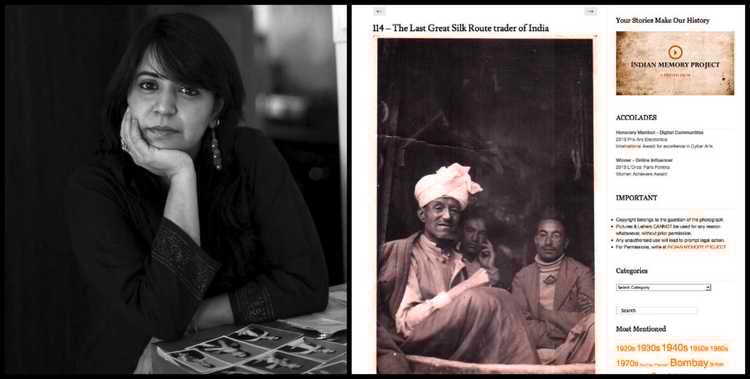By Suchita S.
An LBBD reader once wrote to us saying 'We are a nation of forgetters'. This statement was made as a part of an opinion article she'd written for us; and it hit home. Guilty as charged, I too forget our country's history and heritage from time to time. History, for me, is the revolt of 1857, Gandhi, Bhagat Singh, 200 years of Colonial rule, monuments and heritage sites scattered over Delhi and the length and breadth of India, and I could drop a few more names but they seem to escape me right now. While the big picture - reign, rule and fall of Mughal and Rajput empires, structure of Hindu Temples and architecture of religious buildings, British Raj, and a chronology of Indian History is something we've all studied in High School, there are plenty of little strokes that have been etched and sketched, intertwined somewhere in our country's history, and culminating in the cultural cracker we're witnessing in our cities.
I stumbled upon the 'Indian Memory Project' thanks to the author who wrote that feature for us, and was stimulated in an instant. From the last Silk Route Trader of India, Rabindranath Tagore's foster child, to the Khambhaita Brother's - some of the best rally car drivers in the World {circa 1965} - this 'visual & oral history of the Indian subcontinent via family archives' is all that and much more. It is our history, uncomplicated. There are stories new, old, untold. It documents people who may be long gone but have, in their own capacity, been a part of creating the world that we thrive in today.
Founded in 2010 by photographer Anusha Yadav, IMP is a curation of tales, facts and traditions, which reconstructs India's history in a prolific way - through images shared from family archives, and the story behind the pictures as well. She's received and curated pictures from the 1920's upto 1991, the last year upto which she accepts submissions. Anusha's project - though not just a project anymore - has won accolades and praise from all over the world, and the story behind her and this project is fascinating.
Excerpts from our conversation with her |
LBBD | Tell us a bit about yourself, why you started Indian Memory Project, and the journey so far…
Anusha | I started it in 2010, but the idea had begun in 2008, though it wasn't in the form of Indian memory project. I wanted to do a book with different kinds of wedding photographs and the idea was to trace different kinds of ceremonies and traditions. I thought this could have been a good contribution to how we understand our cultures across the country, because everyone seemed to only want a Bollywoodisqueweddings… that was one of the big reasons. Everybody has one photograph of their weddings or spouse at the least, which is what makes photography such an interesting genre for so many people; it's a trapped memory, what I was interested in was the memory around the picture and not just a caption. I asked people for photographs, and got entries which were interesting and not necessarily about the weddings or the couple… they were about different circumstances, professions, partition, migration, conversion of faith, interracial marriages, polygamy, education, literacy… all these started forming categories in my head, and I found that weddings were just a drop in the ocean. To explore if that would work, the best way was to start a blog… I opened one on wordpress. And soon after, it was picked up, after an article appeared in the newspaper, and it hasn't stopped since then.It has been a great journey ever since. I've found my calling and this is what I'm going to do for the rest of my life. This is true love, this is an important part of my identity.
LBBD | How has this project changed your perception of India's history?
A | I had a very different experience when studying history. I had a great teacher, who would assume, and rightly so, that we'd all remember dates, and that we'd all rehearse these for the exam. That was not the problem at all for her… but to make history more interesting, she'd focus on the stories that were not in the book. She'd tell us a lot more than what was just given in the course book. I find it very interesting in retrospect because I'd write all these stories that she would tell, in short notes in the margins of the book. It was literally like being the story outside of the frame, and IMP is exactly that. It is the story outside the frame, which is capturing the memory around it, trapped in it, with it, around it and that becomes the entire memory of that photograph.
The thing is the future is so scary, I find solace, comfort, and inspiration in the past; I think one of the reasons people like IMP is because the future is so scary, and we have to keep escaping back into the past - it's comforting and simpler.
Also, I think as a culture, we appreciate things only in retrospect. We're not a country that appreciates things as we go along, like the Americans or the British who appreciate both. We also don't know much about our several cultures; we live in a little bubble and we're very happy being in that bubble, in our opinions, and we're scared of changing that opinion because that means changing a point of view, that means dropping your ego and a whole lot of other things. The truth is, we don't really know much about India. For instance, I don't know a lot about the partition or a lot of us are brought up thinking that Pakistan is bad and we don't seem to have questioned that opinion… we just take it for granted without asking what really happened, what they've gone through. So I think we really don't know much. What we also really require in India is a sense of pride, because we don't have it and have lost all esteem, especially in the last decade. It is the only way to become a great country.
What's also intriguing is looking at the way photography has evolved over the years. Earlier, photographers were like the culture police, instructing people on how to dress, how to sit, or stand. A photographer would literally be like a director of a society, culture or community. There are body languages that were used, prescribed, followed, dropped. You should see the one of a lady dressed like Nargis - I discovered that that's what a lot of indian women did, to actually go and explore an alternate identity in a photostudio because they would not be able to do it otherwise. And this arena of role-playing was fascinating…
 LBBD | There's this sense of nostalgia that's coming back to the Delhiwaala - people are celebrating everything from handlooms to khadi, organic produce and so on… what are your thoughts on this return of nostalgia & revisiting the past?
LBBD | There's this sense of nostalgia that's coming back to the Delhiwaala - people are celebrating everything from handlooms to khadi, organic produce and so on… what are your thoughts on this return of nostalgia & revisiting the past?
A | I think earlier, when people lived in larger families, there was a sense of comfort, which today has gone. Everybody's a migrant, most are living by themselves, and now that sense of comfort and security comes from going back to our roots. Also, I feel, this staid hunger for wealth actually leaves all of us empty sooner or later and everybody in their late 30's will start to realize that. But, there's this urge because there was this sense of romance, nostalgia that provides great security, talking about olden times makes people softer and more affectionate. Now it's also scientifically proven - research shows that talking about nostalgic moments can improve relationships, make you greatly tolerant about somebody else, about other issues, and I think we really want that. I mean, look at our country. What's going on? There's no sense of any security that is being offered to us, of any kind. Our daily lives and habits have lost all integrity. And therefore day by day by day everybody wants to get lost in this past, which was really more comforting, simpler, informative, had values… you can find some pride there, which is harder find now.
When we hit the millenium, everybody was so excited about the future, and now we're sitting here 13 years later, so scared of it because nothing's going right and it is hard to find pride. So where do we escape, but to the past.
LBBD | You've had a chance to see, pictorially, the changes our country's seen over the decades - what have been your most interesting observations?
A | Women empowerment is a big category in which you can see an obvious evolution. The role of women over time has changed, and that's beautiful to see. Also, how the partition changed people is interesting… how people moved out of the country because of circumstances, some because of abandonment, a lot of them because of pain. And we carry with us a very painful past, but I hope that the project sort of helps them resolve it, or understand it better. We can only understand, like I said, in retrospect.
The subcontinent is so interesting… it's incredible. I haven't got submissions from a lot of different places, but the last post which is on the last silk route trader was one of the biggest highs I've had - I got this picture from Kargil, and it was so exciting because I usually get pictures from the usual cities like Bombay, Bangalore, Delhi or Jaipur & Chennai, but all the way from Ladakh was something I'd not expected. Silk route for us is almost mythological, the sense of romance and that something happened so many years, almost centuries ago, is mind blowing, to see that.
 {Padmshree winner Brig. Gyan Singh with Pandit Jawaharlal Nehru and Tenzing Norgay at the Himalayan Mountaineering Institute, with a model in mountaineering gear. Darjeeling, West Bengal. 1961} Image and Text contributed by Soni Dave, New Delhi
{Padmshree winner Brig. Gyan Singh with Pandit Jawaharlal Nehru and Tenzing Norgay at the Himalayan Mountaineering Institute, with a model in mountaineering gear. Darjeeling, West Bengal. 1961} Image and Text contributed by Soni Dave, New Delhi
LBBD | In the context of IMP, do you think History repeats itself?
A | I have to confess, I'm not sure yet. I've seen simultaneous stories in a lot of peoples lives. But right now, I can't say. One thing that is proven though is that unjust and political issues have huge huge ramifications in personal lives. They affect our personality, our functioning, our behaviour, and at a personal subconscious level. When you talk to somebody about their past or their past story, you'd assume that they've resolved the matter - that's not always the case because the person who's shared the photograph is also looking for answers to questions which have arisen through those very stories. Sometimes, a story we read and really relate to is because it has something to do with our lives as well, a gentle reminder of something our families and friends too experienced in some way or another, And we're looking for answers through those stories as well. But really apart from that I can't say. I haven't yet experienced that, but I won't be surprised when it comes up.
*
How can LBBD readers contribute/help IMP?
For details on how to contribute please visit this page
If you already know what to do, then please click here instead.
Please note | Any unauthorised or non permitted use of images or text will lead to prompt legal action.


